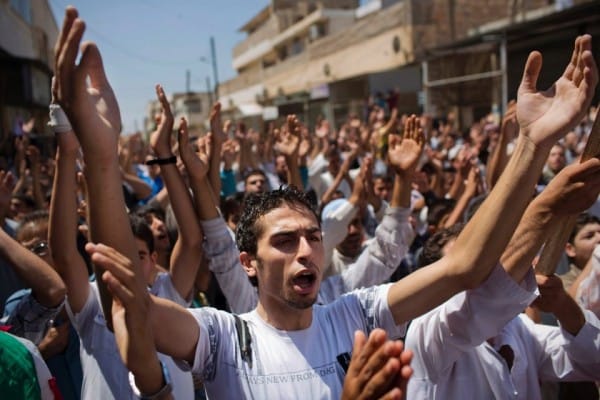Op-Ed: International Community Must Intervene in Syria

Credit: Adam Dean / Panos Pictures

The point of no return is approaching. The international community must get involved in Syria. The weariness is understandable, another conflict in the Middle East. How many of them can there be? Iraq, Tunisia, Egypt, Libya and now Syria, but Syria is different. It is the regional keystone, both geographically and ethnically. Regime change will have consequences for the entire region and recent high profile defections confirm what the international community already knows. The regime is disintegrating from the inside out. How long the Assad regime can hold out is anyone’s guess, but the various component parts of the Syrian regime are unraveling fast.
If the stakes seem high now, take a critical look at the region, as a whole, to see the compound effect the conflict in Syria is having. Factional fighting in Lebanon has gained momentum as Shi’a Muslims support Bashar al Assad, while Sunni Muslims, support the opposition. The head of al-Qaeda in Iraq is urging Iraqis to wage jihad in Syria while security in Iraq goes from bad to worse. The funding, training, and arming of Syrian Kurds by Iraqi Kurds is stressing sectarian tensions in both Syria and Iraq. Syrian Kurds reportedly hold six towns, which domestic terrorists from Turkey are possibly launching attacks from. The massing of Turkish troops on the Syrian border is a justified response. The influx of refugees into Jordan from Syria will naturally act as a force multiplier for an already growing opposition movement. Then there is the wild card - Israel. Their planning is anything but perspicuous and unilateral intervention can shift the dynamic of the entire region should they view the threat as existential.
In this respect, the civil war in Syria can hardly be considered a localized conflict anymore. The regional dynamic is becoming palpable. Funding is being provided from Saudi Arabia and Qatar to the Sunni opposition, some of which will inevitably fall into the hands of Islamists. Iran will continue to supply weapons and support to the current regime through their regional network, which consists of groups in both Lebanon and Iraq. The theme has been set for a regional proxy war, much like in Iraq during the dark days of the insurgency.
None of this even addresses the issue of unchecked chemical and biological weapons. Syria has the largest stockpile in the Middle East and it is not clear how they will be secured post-regime. Whether this threat is perceived or actual the possibility of chemical or biological agents in the hands of Hizbollah, al Qaeda in Iraq, or Hamas could rewrite the security profile, not just for the Middle East, but globally. Circumstances such as these are normally mitigated by the United States, Great Britain or their allies; however, both have strategic complications at home and abroad. It is unlikely that the United States during an election year will either support direct intervention or policy with regards to Syria and Great Britain is still decisively engaged in Afghanistan.
Recent attempts by the United Nations to mediate the conflict have been disappointing, but understandable. They can only provide the assistance that the member states allow them to. This lack of a unified response from the international community will continue to act as an accelerant for both the opposition and the current regime. Human rights abuses are rampant, on all sides, and the longer the conflict continues the harder it will be to encourage reconciliation. Once this happens, the country could divide along sectarian lines, which will be a worse case scenario for the entire region.
The international community must act now or deal with the consequences. If the United Nations can not be the platform for intervention then allied countries need to look towards NATO or re-engage the Arab League, or even a combination of both to resolve this crisis. Mechanisms should have been developed a year ago to safeguard Syria, and the region, from the scenarios that are currently developing. Regime change with a view towards reconcilement is possible, but it takes compromise and foresight, two things currently lacking in the international community.


